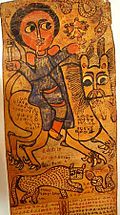Sources
- Holweck, F. G. A Biographical Dictionary of the Saints. St. Louis, Missouri, US: B. Herder Book Co., 1924.
Ethiopian saints by feast day | ||
|---|---|---|
| January | ||
| March |
| |
| May |
| |
| June |
| |
| July |
| |
| August |
| |
| September |
| |
| October |
| |
| November |
| |
| December |
| |
| All months |
| |
Giustino de Jacobis (Roman Catholic), Nine Saints • Armenian Apostolic liturgical calendar, Coptic calendar, Eastern Orthodox liturgical calendar • | ||
| | This article about a saint is a stub. You can help Wikipedia by expanding it. |
| | This biographical article about a person in connection with Oriental Orthodoxy is a stub. You can help Wikipedia by expanding it. |
| | This biographical article about an Ethiopian religious figure is a stub. You can help Wikipedia by expanding it. |
